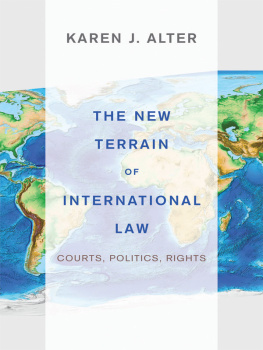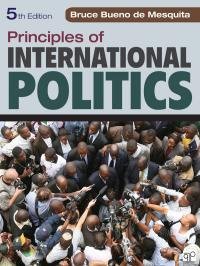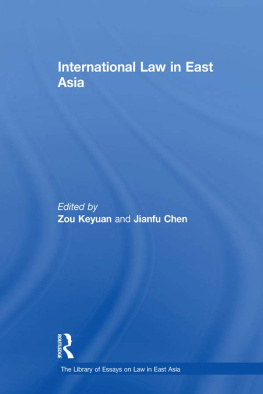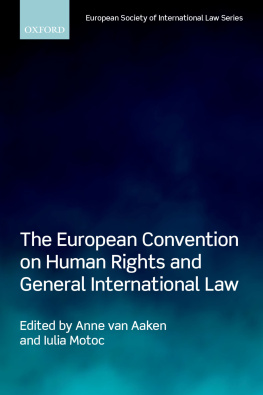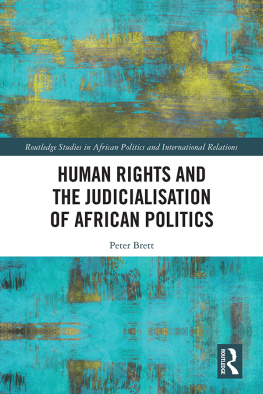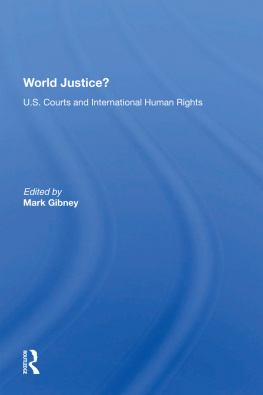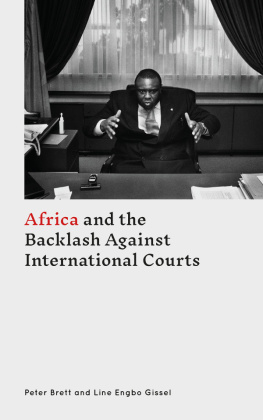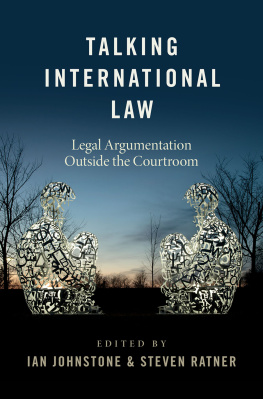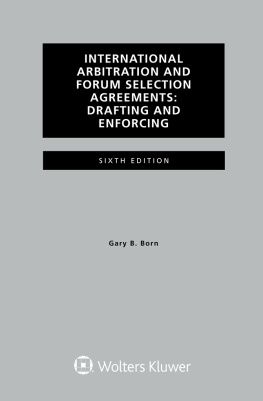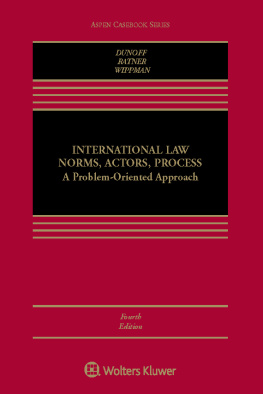
THE NEW TERRAIN OF INTERNATIONAL LAW
____________________________________________________
THE NEW TERRAIN OF INTERNATIONAL LAW
____________________________________________________
Courts, Politics, Rights
Karen J. Alter
PRINCETON UNIVERSITY PRESS
Princeton and Oxford
Copyright 2014 by Princeton University Press
Requests for permission to reproduce material from this work should be sent to Permissions, Princeton University Press
Published by Princeton University Press, 41 William Street, Princeton, New Jersey 08540
In the United Kingdom: Princeton University Press, 6 Oxford Street, Woodstock, Oxfordshire OX20 1TW
press.princeton.edu
Portions of the text and have appeared in Interdisciplinary Perspectives on International Law and International Relations: The State of the Art, edited by Jeffrey L. Dunoff and Mark A. Pollack. New York: Cambridge University Press. Reprinted with permission
All Rights Reserved
Library of Congress Cataloging-in-Publication Data
Alter, Karen J.
The new terrain of international law : courts, politics, rights / Karen Alter.
pages cm.
Includes bibliographical references and index.
Summary: In 1989, when the Cold War ended, there were six permanent international courts. Today there are more than two dozen that have collectively issued over thirty-seven thousand binding legal rulings. The New Terrain of International Law charts the developments and trends in the creation and role of international courts, and explains how the delegation of authority to international judicial institutions influences global and domestic politics. The New Terrain of International Law presents an in-depth look at the scope and powers of international courts operating around the world. Focusing on dispute resolution, enforcement, administrative review, and constitutional review, Karen Alter argues that international courts alter politics by providing legal, symbolic, and leverage resources that shift the political balance in favor of domestic and international actors who prefer policies more consistent with international law objectives. International courts name violations of the law and perhaps specify remedies. Alter explains how this limited powerthe power to speak the lawtranslates into political influence, and she considers eighteen case studies, showing how international courts change state behavior. The case studies, spanning issue areas and regions of the world, collectively elucidate the political factors that often intervene to limit whether or not international courts are invoked and whether international judges dare to demand significant changes in state practices Provided by publisher.
Includes bibliographical references and index.
ISBN 978-0-691-15474-9 (hardback) ISBN 978-0-691-15475-6 (paperback) 1. International law. 2. International courts. 3. Human rights. I. Title.
KZ3410.A44 2013
341dc23
2013022405
British Library Cataloging-in-Publication Data is available
This book has been composed in Sabon LT Std
Printed on acid-free paper.
Printed in the United States of America
10 9 8 7 6 5 4 3 2 1
For Abby and Elliot
Contents
_____________
Illustrations
_____________
Case Study Index
_____________
DISPUTE SETTLEMENT
5.1 ICJBahrain v. Qatar territorial disputeInternational Court of Justice resolves a territorial dispute, which facilitates regional economic development
5.2 ITLOSJapan v. Russiaseizing of vesselsInternational Tribunal for the Law of the Sea assures fair treatment of Japanese vessels seized for illegal actions in Russian waters (Tomimaru and Hoshinmaru cases)
5.3 Iran-US mass claims tribunalAdjudicating disputes arising from the Iranian revolution
5.4 OHADA business lawThe Organization for the Harmonization of Business Law in Africa as an appellate body for cases involving OHADA Uniform Acts
ADMINISTRATIVE REVIEW
6.1 ECJMicrosoft and GE/Honeywell merger casesOversight of Commission administrative decisions
6.2 ATJBelmont caseThe Andean Tribunal fills lacunae and coordinates transnational administrative decision making
6.3 NAFTA and WTOSoftwood lumberNAFTA binational and WTO review of national determinations of dumping and countervailing duties
6.4 ICSIDMetalclad ICSID investor dispute settlement systems to compensate for administrative takings
A DMINISTRATIVE C ASES IN O THER C HAPTERS
ITLOSJapan v. Russiaseizing of vessels (5.2), Second use patent caseATJ annulment of Peruvian second use patent decree (7.2), Seizing private assets(Kadi) case (8.2)
LAW ENFORCEMENT
7.1 WTOForeign Sales CorporationWTO review of the United States special tax treatment for goods exported abroad
7.2 ATJSecond use patent caseAndean Tribunals review of Perus policy granting patents for new medical uses
7.3 ECOWASModern day slavery caseECOWAS court finds that Nigers government has not done enough to remedy enslavement via family law
7.4 Special Court for Sierra LeoneCharles Taylor caseIndictment, arrest, and conviction of Charles Taylor, president of Liberia, for crimes committed in a neighboring country
E NFORCEMENT C ASES IN O THER C HAPTERS
Metalclad ICSID lnvestor dispute settlement (6.4), NAFTA and WTOSoftwood lumber (6.3), ATJColombia and Ecuador alcohol-related practices case (8.4), ICTRRape as a war crime case (8.6) (Prosecutor v. Akayesu), ECJWomen in combat support roles case (8.3), IACtHRIndigenous land rights case (8.5)
CONSTITUTIONAL REVIEW
8.1 ATJPeru exemptions caseATJ invalidates a collective executive decision exempting Peru from Andean Free Trade Area requirements
8.2 ECJSeizing private assets (Kadi) caseECJ invalidates a Council regulation implementing an act of the UN Security Council and a Commission action implementing a UN Sanctions Committee decision (Kadi v. Commission)
8.3 ECJWomen in combat support roles caseECJ rejects a German constitutional provision barring women in combat support roles (Tanja Kreil v. Bundesrepublik Deutschland)
8.4 ATJColombia and Ecuador alcohol-related practices caseATJ finds Colombian and Ecuadorian alcohol policies to violate Andean free trade rules
8.5 IACtHRIndigenous land rights caseIACtHR creates a positive obligation for Nicaragua to demarcate land rights for the Awas Tingni
8.6 ICTRRape as a war crime caseICTR creates command responsibility to stop sexual violence
CASE STUDIES BY SUBJECT MATTER AND COUNTRY
E CONOMIC L AW
5.4 OHADA Business Lawvarious business codes in Francophone Africa
6.1 ECJMicrosoft and GE/Honeywell merger casesantitrust in Europe
6.2 ATJBelmont caseintellectual property (trademarks) in Colombia and Ecuador
6.3 NAFTA and WTOSoftwood lumber disputeantidumping in the United States
6.4 ICSID and NAFTAMetalcladinvestor dispute in Mexico
7.1 WTOForeign Sales Corporationsubsidies in the United States
7.2 ATJSecond use patent caseintellectual property (patents) in Peru
8.1 ATJPeru exemptions casederogations from free trade provisions in Peru
8.4 ATJColombia and Ecuador alcohol-related practices caseNontariff barriers to trade in Colombia and tariff barriers in Ecuador
H UMAN R IGHTS L AW
7.3 ECOWASModern-day slavery caseforced labor, family law practices in Niger
8.2 ECJSeizing private assets (Kadi) casedue process rights in the European Union
8.3 ECJWomen in combat support roles casegender equity in Germany
8.5 IACtHRIndigenous land rights caseland rights of indigenous peoples in Nicaragua
W AR C RIMES
7.4 Special Court for Sierra LeoneCharles Taylors indictment and arrest in Sierra Leone and Liberia
Next page
